#Villains Are their characters flaws <3
Note
What makes a villain a villain for you? Idk very broad question no wrong answers to it
I tend to conflate "villain" and "antagonist" - or at least antagonistic, if they're a main character like Charm is haha - someone who impedes others, who seeks to do harm, who is in some way uncontrollable and therefore dangerous. I also tend to like villains that have someone or something to rage against, very Megamind haha - "If there's bad, good will rise up against it."
Villains can be as complex or simplistic as you like, which is very fun! Some villains like to be evil for funsies! Some are tortured! Some don't realize that what they're doing is harmful! Yves is great example of a BBEG who has only good intentions imo (and coincidentally, is also modeled after my own ADHD lol, I have something of a soft spot for dysregulated villains haha)
One of my favourite aspects of the True Villainy AU, and kind of Just Desserts S2 as a whole, is how different types of villains look and move in that world - Charm was seduced by thoughts of revenge that stemmed from loneliness and bitterness, where Kaiein is a manipulative asshole who gets his kicks from causing chaos from the sidelines. Their motivations are very different, but they both do harm, and are both stopped! Villains ✨
#Villains have a lot of wiggle room for what makes them villains I think :)#And there's certainly more shades of grey to explore than the fairly black-and-white villains that I tend to like lol#Charm is pretty black and white - she's a villain until she isn't#It's still hard for her because she ''learned'' all these maladjusted behaviours to get through her life but she keeps trying!#Kaiein is very black and white - literally lol - he's a villain for funsies and has to be defeated rather than recovered#And Yves is quite black and white as well! He doesn't really consider the harm that he does until it's too late! And he still doesn't stop!#I think just about any antagonist Can be a villain depending on the framing - including those trying to stop my villains here#The JD Residents are villains for causing Charm mental anguish - that's why she seeks revenge in the first place!#And again they're the villains for taking away Kaiein's fun toy - you can tell I have little sympathy for him lol#The AGE crew are villains for trying to stop Yves from resurrecting his God and recreating the spiritual Cambrian explosion!#I think what makes a villain a villain is the harm they're willing to cause on the way to their goal#Anyone properly motivated can be twisted into the shape of a villain - what lengths are they willing to go to? Who are they willing to hurt#It's about finding the Hubristic Downfall and digging from there#Villains Are their characters flaws <3#I feel like I've mentioned it somewhere but I view Charm specifically as being endearingly flawed like a cat lol#Cats can have so many characters flaws that we would find unacceptable in humans but are charming - haha - in a cat#Charm is my self-love by way of cat-ifying my own character flaws <3 It's why I like villainsonas so much!!#They're little guys! Evil little guys <3 I think it's great :D#Just Desserts#Villainsona#AGE#Yves
2 notes
·
View notes
Text
why does the pjo series have to unnecessarily villainize goddesses (hera & athena) or show them as silly ladies (aphrodite & demeter) BUT posiedon and apollo are somehow shown as the coolest/most likeable gods, even though arguably, they're right after zeus on terms of corruption?
ares shown as the worst god after zeus and hera amuses me. last time i checked, he was the patron god of amazons and literally killed a man for attempting to rape his daughter but guess who cursed women for rejection? apollo. guess who raped women when they said no (aside from zeus)? posiedon.
#all the gods and goddesses in the greek mythology are flawed in their own way#it doesn't make sense why the books were so unnecessarily biased towards certain gods?#it bothers me specifically that hera and athena are SO unnecessarily painted as villains#while posiedon is ‘cool’ dad ‘great’ lover ‘decent’ god ‘reasonable’ than other olympians#i get it he's the main character's father of a children's fantasy novel so rick painted him in a good light#but my man? then why are you painting other gods who are arguably just as bad as him as WORSE#shut up i feel strongly about it#i love the percy jackson series#but i hate how the gods are portrayed#is trials of apollo a good series? yes#does it make sense why he's shown as a human-like god with redemption arc#while hera is reduced to ‘evil stepmom’ and ‘bitch to annabeth’ even if apollo is JUST as bad as her?#no#and aphrodite is not some ‘silly fangirl’ whose personality revolves around shipping percabeth#she is powerful terrifying and cunning who can bestow some of worst revenge on those who offend her#demeter is not a silly crop goddess#her love for her daughter was so strong it almost ended the world and destroyed mankind#shes in charge of harvest and agriculture without her humanity will starve to death#shes just as powerful as the big-3 or at least she should be#posiedon is not this cool perfect rational god#medusa would disagree demeter would disagree pasiphae would disagree odysseus would disagree#apollo cursed women posiedon raped yet ares killed a rapist BUT nooo let's make ares the bad one#percy jackson#rr crit#greek mythology#heroes of olympus#trials of apollo
66 notes
·
View notes
Text
A friendly reminder that Laudna and Imogen didn't know that Fearne didn't want the shard and WHY she didn't want it. It is painful to see them tell her they are disappointed and that she should have taken it BUT they have only found out she didn't intend to take it when she told them so after Ashton's attempt. When they were talking before she was scared but was discussing the idea of taking the shard and what they might have to do after that, while also saying that it maybe should go to Ashton. And they were later led to the idea by Fearne and Ashton that yes, she is the one taking it after all. I am not blaming Fearne! She is hurt! But don't say Imogen and Laudna are the worst people alive for telling her that they are disappointed. They are allowed to have feelings, just try to put yourselves in their shoes too. She hasn't told THEM she didn't want it. She told Ashton, she told Chet and only Chet and Orym know WHY she wouldn't want it, as only they know about the dark fearne from EXU. It was awful to hear that from her fellow witches and it pains me to see her experience that. She doesn't deserve it. But she is not communicating her feelings, she needs to learn to do that. She was the only one during the honesty challenge to not share ANYTHING personal (saying she thinks they are not good enough for the mission isn't personal, come on, they mostly agree on that). Though I do understand why it is so hard for her, especially right now after what happened when she let herself feel and share her feelings. Both Imogen and Laudna are far from perfect and have many of their own issues and contradictions. And so does Fearne. They are not perfect, they have feelings and they may be misguided too, they are just people! Just remember that before you start a witch hunt (heh) and decide to burn them, especially Imogen, at the stake again.
#if i see one more post calling imogen a bitch#how many times does matt have to like takes on imogen for people to understand she is flawed but she is at her core a good person#she makes mistakes she is not perfect#she could be a villain but she is not because she chooses to be good#every campaign this shit with some of the female characters gods dammit#cr spoilers#c3e79#critical role spoilers#cr campaign 3#bells hells#cr imogen#cr fearne#cr laudna#cr chetney#cr ashton#fearne calloway#imogen temult#the witchy trio
68 notes
·
View notes
Text
Modu by priest was truly such a good read. If you like romance? It has a sweeping romance, with a well done bisexual and gay lead (and straight best friend) all written in ways that manage to feel realistic, it's got features people likely found it for when looking for a danmei - rich manipulative younger man, older investigator who's got a hero streak, and yet those categories don't really do justice to them (and of course tao ran is the more grounded detective story lead who keeps his theories to himself and worries about dragging others into his mess).
They're so much more... Fei Du is a traumatized young man who's worried he's as monstrous as the people who scarred him, who is preparing to take the leap and cross the line to become an even more terrifying version of himself if it will destroy the corruption poisoning this city and harming so many, Luo Wenzhou is a cop that used to want to be a hero and learned he will fail people and be unable to save people and holds onto Fei Du as someone who reminds him he DOES fail but also reminds him why he wants so hard to keep Trying to help people even when it seems impossible... why trying and putting in effort to care and help Even when its too late to fix things is Worthwhile. Tao Ran is a contrast to them both, Fei Du living in a world where there's only monsters and victims and Luo Wenzhou desperately trying to force the world to be a place where justice CAN prevail and win even as he sees it fail over and over, trying so hard to believe all people have the capacity for everything and are worth trying to save. Even though Fei Du doesm't believe that, being around Luo Wenzhou makes him want to consider it. Tao Ran, their contrast? Believing the world can go either way, and its up to people like him to create any justice at all, any structure at all, or else everything is just meaningless suffering chaos. As characters, the three of them serve to explore how the world works and views on it in terms of a detective murder mystery encompassing the whole city, the small scale version of the world. Modu is a romance, but its also fully commited to being a murder mystery that wants to tackle the kind of themes that come up in the setting it's created. Its characters are so much more than Insert Character Ship types here. These characters were made this way to explore these ideas (just as the villains are all made to parallel and contrast Fei Du to explord these ideas in comparison to our point of view Fei Du moments, our impressions of Fei Du from Luo Wenzhou and Tao Rans varied perspectives, all of them are different lenses to view humanity and how it works, if the world is just or if we have to make it good, if we can be inherently good and if good people will reach out to us if we just keep treading water to survive, if its luck and chaos, and how much... and much more frankly).
Modu is like. If you want a story about a corrupt city and its victims, symbolizing a corrupt world and all of us at its mercy, and you want to see the heart of the people doing something about it. First the main trio, but also every victim Fei Du recruits to help, every murderer recruited to the corruption, all the people in the cases swayed to some side. Thats what Modu is about.
The romance is just one facet of exploring that, the personal debate about what these things mean about the world as told through two people who view this world incredibly differently. Yet find some way to exist in the same space, same mutual world, when together. It hooks you in and doesn't let you go and youre wondering right there with them, left to draw your own meaning in the end. Hopefully that its worth trying, that doing something is worth trying even when its just the trying you can do and not the succeeding, at least thats what I got from it (at least in regards to Fei Du and Luo Wenzhou meeting each other, unable to live up to the pillar they put each other on but trying anyway, is what I felt from them).
Then like? Modu gives you THAT story, which in its own right is enough to make you contemplate.
And if you're like me and care about people, about characters? Well it gives you, like I said, those big themes and a city's nightmares symbolizing the world, and brings them down to an individual level. You read from the mind of the little girl who grew up in this (one of my favorite scenes and when I felt this novel was going to not shy away from dark psychological moments and bringing them to you). You read from the mind of Fei Du when he knows himself, when he doesn't. You read from the minds of all kinds of people, and the heart of much of the investigation is peoples motives and things they'd gone through and how that shaped what they'd do next. Why they'd do it. Leaving you to wonder who's right. Jaded idealist Luo Wenzhou who wants to believe in the goodness of the people he loves, but also is willing to risk that strangers may have good intent? Fei Du who thinks theres only victims and perpetrators and everyone is going to fall into one in the right circumstance? Tao Ran, who feels the world is too messy to dare declare predictable, who thinks even your closest can betray you and even you can accidentally hurt them, nevermind strangers, and the only thing you can control and rely on is your own choices? Some mix? None of them? The side characters as they come up, grow and evolve, do they understand the world better or worse, and is the world they experience different than anothers and justify why their worldview is likewise different? Modu gives you that up close and personal, over and over. Im still thinking about it. And the way its done, they all get to feel like lived in people. Not structures to tell the themes only. But on their own, there's a personal struggle between Fei Du feeling like a monster who'll destroy Lup Wenzhou if he loves him, like his dad destroyed his mom, and Luo Wenzhou carrying the guilt he could never save Fei Du and desperate to believe in Fei Du (and keep trying to save him in that way if only that way) as person who can do good despite not being saved and despite Fei Du's fears. You could cut the entire city's plot away, all of the crimes and make the city calm, and still that core of their plot would be carrying a Lot of weight. Theyre playing a game of "enemies" to lovers sure, or whatever romance story structures they fit into. But they're also made to be deeply rooted into each other, their personal beliefs tied into the outcome of what they hope or fear happens if they are close together. Modu made me care about that. Its like the fears many people might have, abiut theur own flaws, about getting close to others, about trusting and being unsure if that trust is safe to give. Its that and magnified into bigger form, in this landscape of a fucked up city and the tragedy of Fei Du and Luo Wenzhou's meeting and former lives.
Its like. Id love to to read another danmei (Ive got a lot on my to read list). But what's going to give me roo
#modu#silent reading#lb#meta#like... modu was so fucking good.#it was 3 characters symbolizing their city symbolizing the world in terms of worldviews morality justice and if theres a point to#trying to help at all. like damn#i want to read ANOTHER danmei that makes me weigh those questions. that uses the characters this personally and intimately with the readers#because the Characters weigh the themes in their OWN lives so heavily.#like... i know priest can probably give me this kind of huge delivery in can ci pin and sha po lang (at least i estimate#priesr probably can as theyre very popular novels by priest)#and 2ha can (because ive read half and know its themes)#but like. what other danmei can? can thousand autumns? can peerless? can wu shang jie?#can Mistakenly Saving the Villain?#like... the only non priest danmei i read was svsss and i got supremely lucky#cause i personally LOVE satire and critique commentary affection for the topics it explores#and svsss AS a satire is incredibly well done. having read 2ha first? and seen Eternal Love?#svsss does an amazing job at critiquing webnovel culture and flaws. at the way capitalism effects writing#at the way some tropes have become staples of certain genres and when used well yeah you get 2ha but when used badly you get#the fake novel svsss was making fun of that there Are many real novels like
65 notes
·
View notes
Text
theyre obviously drawing parallels of the wittebane brothers with hunter and luz, but hopefully with less fratricide. so what if it actually gets acknowledged in canon?
when they run into him, belos sees the echo of his brother with a younger human peer. they’re taking care of each other and gallivanting around in masks, having adventures like phillip and caleb used to. before they got to the demon realm and everything fell apart. before caleb fell in with the witches and phillip took the CLEARLY righteous path and rejected that world.
except luz and hunter have already been in the demon realm. luz has taken the magic and the culture of the isles and flourished. despite all of belos’s efforts, hunter has also studied wild magic and even ultimately betrayed him like caleb did. and now instead of convincing hunter to return to puritan sensibilities in the human world like belos wanted to do for caleb long ago, luz has converted them both to heretics. and their relationship is better for it.
but belos will never admit that the problem was himself. that if he had embraced the boiling isles, or even just tolerated his brother’s embrace of it, then he wouldn’t have “had” to kill caleb. so instead he looks on with envy at luz and hunter, who could have been phillip and caleb in another life but achieved this while doing everything wrong, and rages.
#toh#the owl house#luz noceda#hunter toh#phillip wittebane#caleb wittebane#emperor belos#the owl house season 3#thanks to them#uuuuuuoooooooggggghhhhhhhhhhuuuuuuuueeeeeeee belos is such a good villain#bro is living out a century spanning greek tragedy in old americana#luz and hunter are phillip and caleb but better#he has systematically destroyed every loved one and every ally#and he will never admit to his own wrongdoings out of the intrinsic flaw to his character#but deep down he knows its his own fault#and instead of acknowledging it and reflecting on it he just keeps destroying#luz and hunter are siblings
856 notes
·
View notes
Text
let's keep in mind that darcy is not the only character who needs to alter his ways in p&p ♡
#will you people let women have flaws and love them FOR THAT? will you ever?#with jo and lizzie it's easy to ignore their wrongs and that's probably why they're so universally beloved#but like... GOSH. why is the standard for female characters: be perfect but not too perfect to be boring and be a badass but don't go#overboard or i'll dislike you#:///////// and you can thirst for your male villains i guess. i'm besties with cathy earnshaw <3#sorry the poll got to me i am taking this too seriously#jo in the tardis*#this is also why i don't feel as close to p&p as i used to...#girlboss!lizzie and sad little meow meow!darcy are quite telling interpretations is all i'm saying. (coming from a female darcy)
226 notes
·
View notes
Text
Random observation while listening to the FF9 OST. The track Eternal Harvest that plays over that scene of Freya joining the Cleyrans in their protection ritual is absolutely gorgeous, but I wish my memory of it wasn’t that awkwardly mocap-ed scene and was a cinematic instead. It had the potential to be a lot more powerful if given the weightiness of a cinematic, and ofc is Freya had been more fleshed out instead of having her arc come to a dead stop in the middle of the 3rd disc.
Freya and Garnet are both great conduits to explore the devastation that Kuja left in his wake on a personal level. But while Garnet is through the eyes of a young woman struggling as a leader against such incredible odds, Freya had the potential to be a great exploration of the more personal and cultural aspect of that destruction. Her people are already appeared to be a somewhat disliked minority, which is what made them an easy first target for Brahne compared to her in-laws in Lindblum. And unlike Alexandria and Lindblum where despite their state, it’s implied that the kingdoms are still fit to rebuild, the Burmecians are really fucked over. Their country was the first to be attacked and therefore didn’t have time to prepare, and then the other Burmecian state of Cleyra where most of the refugees fled to was DISINTEGRATED.
Like Freya might be the character with the most baggage to explore. After witnessing the ruins of Burmecia she comes to this ancient bastion of her people, and despite not fully respecting their distinct way of life, she partakes in their ritual, hoping it will be able to protect the last of them. And then not even an hour later, right from under her that citadel is literally wiped off the face of the earth. It’s haunting to think about, and I deeply wish it could have been explored beyond just a bit of her grieving before launching into more shenanigans.
Not that her being forced to so quickly move on isn’t powerful in itself, but I wish there was more EMPHASIS. Emphasis that could have come from a beautifully directed cinematic of that ritual she performed in vain. Able to visually represent that fragile, majestic hope the track accompanying it conveys.
#final fantasy IX#ff9#freya crescent#shut the heck up#tag talking#me when i listen to a song from a game and get blindsided by how much i love it#despite its flaws#besides a few core characters there are so many poorly executed arcs :((#atleast i have the best character ever written (kuja) and those 3 people who really really hate him#actually i love every villain in ff9#and zizou garnet and vivi are just really good at supporting them#the rest of the cast.........#well no i love eiko too but i also remember feeling like she could have done more#i just love her relatinoship with garnet its so sweet#see if garnet and eiko can have arcs about exploring their identity/race why couldnt freya?#shit even zidane and vivi get that ghdkfgjsdkfs#i want to talk about freyas ethnic pain
11 notes
·
View notes
Text
babygirlifying my tyrant war criminal mass murderer villain guy.
#i'm not but i am.#me when i make a tragic villain whose arc is Understandable and heartbreaking but i also refuse to absolve him or ignore the Glaring Flaws#In His Character#hehe bastard <3#but also my jumpy guy...
2 notes
·
View notes
Text
Types of side characters
1. Foil Characters: These side characters are designed to contrast with the main character, highlighting their qualities or flaws. Foil characters can provide a different perspective and challenge the main character's beliefs or actions.
2. Mentors or Guides: These side characters serve as mentors or guides to the main character, providing wisdom, guidance, and support. They often have more experience or knowledge in a specific area and help the main character navigate challenges or learn important lessons.
3. Comic Relief Characters: These side characters bring humor and levity to the story. They provide comedic relief during intense or serious moments and can help balance the overall tone of the narrative. Their wit, clumsiness, or unique personality traits make them enjoyable and entertaining.
4. Love Interests: Love interests are side characters who are romantically involved with the main character. They add a romantic subplot to the story and can contribute to the main character's personal growth and development. Love interests can be supportive, challenging, or even create conflict within the narrative.
5. Antagonists or Villains: Side characters can also take on the role of antagonists or villains. They oppose the main character's goals and create conflict and tension in the story. Antagonists can have their own motivations, complexities, and backstories, making them more than just one-dimensional obstacles.
6. Friends or Allies: These side characters are the main character's companions, friends, or allies. They provide emotional support, camaraderie, and assistance throughout the story. Friends or allies often share common goals and values, and their relationships can help showcase the main character's growth and strengths.
7. Family Members: Side characters who are family members of the main character can play significant roles in shaping their identity and backstory. They can provide emotional connections, conflict, and a sense of history within the narrative.
8. Background Characters: While not all side characters have to be highly developed, background characters help create a sense of realism and immersion in the story. They populate the world and add depth to the setting, even if they have minimal impact on the main plot.
9. Rivals or Competitors: These side characters compete with the main character, pushing them to improve, overcome obstacles, or achieve their goals. Rivals or competitors can be a source of conflict, motivation, and personal growth for the main character.
10. Witnesses or Observers: These side characters serve as witnesses or observers of the main events in the story. They may provide insights, commentary, or serve as a narrative device to convey information to the reader.
#writing#writer on tumblr#writerscommunity#writing tips#character development#writer tumblr#writblr#writing advice#oc character#writing help#creative writing#side characters
5K notes
·
View notes
Text
5 Tips for Creating Intimidating Antagonists
Antagonists, whether people, the world, an object, or something else are integral to giving your story stakes and enough conflict to challenge your character enough to change them. Today I’m just going to focus on people antagonists because they are the easiest to do this with!
1. Your antagonist is still a character
While sure, antagonists exist in the story to combat your MC and make their lives and quest difficult, they are still characters in the story—they are still people in the world.
Antagonists lacking in this humanity may land flat or uninteresting, and it’s more likely they’ll fall into trope territory.
You should treat your antagonists like any other character. They should have goals, objectives, flaws, backstories, etc. (check out my character creation stuff here). They may even go through their own character arc, even if that doesn’t necessarily lead them to the ‘good’ side.
Really effective antagonists are human enough for us to see ourselves in them—in another universe, we could even be them.
2. They’re… antagonistic
There’s two types of antagonist. Type A and Type B. Type A antagonist’s have a goal that is opposite the MC’s. Type B’s goal is the same as the MC’s, but their objectives contradict each other.
For example, in Type A, your MC wants to win the contest, your antagonist wants them to lose.
In Type B, your MC wants to win the contest, and your antagonist wants to win the same contest. They can’t both win, so the way they get to their goal goes against each other.
A is where you get your Draco Malfoy’s, other school bullies, or President Snow’s (they don’t necessarily want what the MC does, they just don’t want them to have it.)
B is where you get the other Hunger Games contestants, or any adventure movie where the villain wants the secret treasure that the MCs are also hunting down. They want the same thing.
3. They have well-formed motivations
While we as the writers know that your antagonist was conceptualized to get in the way of the MC, they don’t know that. To them, they exist separate from the MC, and have their own reasons for doing what they do.
In Type A antagonists, whatever the MC wants would be bad for them in some way—so they can’t let them have it. For example, your MC wants to destroy Amazon, Jeff Bezos wants them not to do that. Why not? He wants to continue making money. To him, the MC getting what they want would take away something he has.
Other motivations could be: MC’s success would take away an opportunity they want, lose them power or fame or money or love, it could reveal something harmful about them—harming their reputation. It could even, in some cases, cause them physical harm.
This doesn’t necessarily have to be true, but the antagonist has to believe it’s true. Such as, if MC wins the competition, my wife will leave me for them. Maybe she absolutely wouldn’t, but your antagonist isn’t going to take that chance anyway.
In Type B antagonists, they want the same thing as the MC. In this case, their motivations could be literally anything. They want to win the competition to have enough money to save their family farm, or to prove to their family that they can succeed at something, or to bring them fame so that they won’t die a ‘nobody’.
They have a motivation separate from the MC, but that pesky protagonist keeps getting in their way.
4. They have power over the MC
Antagonists that aren’t able to combat the MC very well aren’t very interesting. Their job is to set the MC back, so they should be able to impact their journey and lives. They need some sort of advantage, privilege, or power over the MC.
President Snow has armies and the force of his system to squash Katniss. She’s able to survive through political tension and her own army of rebels, but he looms an incredibly formidable foe.
Your antagonist may be more wealthy, powerful, influential, intelligent, or skilled. They may have more people on their side. They are superior in some way to the protagonist.
5. And sometimes they win
Leading from the last point, your antagonists need wins. They need to get their way sometimes, which means your protagonist has to lose. You can do a bit of a trade off that allows your protagonist to lose enough to make a formidable foe out of their antagonist, but still allows them some progress using Fortunately, Unfortunately.
It goes like… Fortunately, MC gets accepted into the competition. Unfortunately, the antagonist convinces the rest of the competitors to hate them. Fortunately, they make one friend. Unfortunately, their first entry into the competition gets sabotaged. Fortunately, they make it through the first round anyway, etc. etc.
An antagonist that doesn’t do any antagonizing isn’t very interesting, and is completely pointless in their purpose to heighten stakes and create conflict for your protagonist to overcome. We’ll probably be talking about antagonists more soon!
Anything I missed?
#writing#creative writing#writers#screenwriting#writing inspiration#writing community#filmmaking#books#film#writing advice#antagonists#villains#writing antagonists#5 tips for creating intimidating antagonists
2K notes
·
View notes
Text
"Why do people dislike Zuko/Zutara stans??"
Mmmh

🤦♂️
Sorry but I can't stay silent anymore, these posts are insane
Aang: a kid/genocide survivor lashing out because his best friend and only living link to his people has been stolen. The avatar state (a power he is afraid of) was a response to losing another part of his home, the only person connecting him to his past and eradicated culture
Katara: saw Aang loosing control in the avatar state and CHOSE to be at his side and help him, because she KNOW what's it's like having your loved ones stolen from you, she is hurt from seeing him hurting because she's an empathetic person and she loves him. She's comforting a friend during an emotional crisis.
Zutara/Zuko's stans: Ugh violent destructive tantrums save yourself katara! Zuko <3
Mh ok.
It's funny because those people are stanning a character who called Katara a peasant and threatened to wipe her village and only were in good terms in the last few episodes. They are stanning a character who was a villain/antagonist for two seasons (and half of season 3) who tried to kill her and her friends over and over again. But that's ok, he suffered and redeemed himself in the last 3 episodes, so it doesn't matter, while everything the abuser/toxic Aang """did""" was beyond forgiveness.
That's the message of Avatar the Last Airbender :)
The way people in this fandom are so unempathetic towards a 12 year old who lost everything is so crazy to me.
These episodes are full of sad moments with a lot of hurt behind it. These are all children (child soldiers also) overwhelmed by moments of severe loss. These children are human and they have flaws.
This is why being a fan of most animated content sucks as their fanbases have the intellectual capacity of a goldfish
#avatar the last airbender#atla#aang#katara#kataang#zuko#anti zutara stans#anti zuko stans#free aang#free katara#free zuko#this series deserves a BETTER fandom#WHAT SERIES ARE YOU WATCHING
344 notes
·
View notes
Text
The 5 Most Essential Turning Points in a Character’s Arc
You spend so much time creating a character because you want them to feel real. You want to connect with them and use them to create an experience for your readers. Their character arc is how that happens.
Don’t miss out on these essential turning points that make an arc feel not only whole, but complete.
1. The Inciting Incident
Your inciting incident gets your plot moving. It isn’t going to be the first sentence of your story (also called your hook), although it could be if you crafted your first sentence for that purpose.
An inciting incident is a plot event that guides your character in a new direction. It’s the successful prison break, the meeting of instant rivals, or the moment your protagonist wins the lottery in your first chapter.
Without the inciting incident, your protagonist’s life would carry on as usual. They wouldn’t start the arc that makes them an interesting person for the reader to stick with throughout your story.
2. Introducing the Protagonist’s Main Flaw
Every protagonist needs a primary flaw. Ideally, they’ll have more than one. People aren’t perfect and they rarely get close enough to only have one negative characteristic. Protagonists need that same level of humanity for readers to connect with them.
There are many potential flaws you could consider, but the primarily flaw must be the foundation for your character’s arc. It might even be the catalyst for the story’s peak.
Imagine a hero archetype. They’re great and well-intended, but they have a problem with boasting. Their arc features scenes where they learn to overcome their need to brag about themselves, but they get drunk and boast in a bar right before the story’s peak. The antagonist’s best friend hears this because they’re at the same bar, so they report the hero’s comment to the main villain. It thwarts the hero’s efforts and makes the climax more dramatic.
Other potential flaws to consider:
Arrogance
Pride
Fear
Anxiety
Carelessness
Dishonesty
Immaturity
3. Their First Failure
Everyone will fail at a goal eventually. Your protagonist should too. Their first failure could be big or small, but it helps define them. They either choose to continue pursuing that goal, they change their goal, or their worldview shatters.
Readers like watching a protagonist reshape their identity when they lose sight of what they wnat. They also like watching characters double down and pursue something harder. Failure is a necessary catalyst for making this happen during a character’s arc.
4. Their Rock Bottom
Most stories have a protagonist that hits their rock bottom. It could be when their antagonist defeats them or lose what matters most. There are numerous ways to write a rock-bottom moment. Yours will depend on what your character wants and what your story’s theme is.
If you forget to include a rock-bottom moment, the reader might feel like the protagonist never faced any real stakes. They had nothing to lose so their arc feels less realistic.
Rock bottoms don’t always mean earth-shattering consequences either. It might be the moment when your protagonist feels hopeless while taking an exam or recognizes that they just don’t know what to do. Either way, they’ll come to grips with losing something (hope, direction, or otherwise) and the reader will connect with that.
5. What the Protagonist Accepts
Protagonists have to accept the end of their arc. They return home from their hero’s journey to live in a life they accept as better than before. They find peace with their new fate due to their new community they found or skills they aquired.
Your protagonist may also accept a call to action. They return home from their journey only to find out that their antagonist inspired a new villain and the protagonist has to find the strength to overcome a new adversary. This typically leads into a second installment or sequel.
Accepting the end of their arc helps close the story for the reader. A protagonist who decides their arc wasn’t worth it makes the reader disgruntled with the story overall. There has to be a resolution, which means accepting whatever the protagonist’s life ended up as—or the next goal/challenge they’ll chase.
-----
Hopefully these points make character arcs feel more manageable for you. Defining each point might feel like naming your instincts, but it makes character creation and plotting easier.
Want more creative writing tips and tricks? I have plenty of other fun stuff on my website, including posts like Traits Every Protagonist Needs and Tips for Writing Subplots.
#character arcs#creating characters#creating character arcs#character development#writing characters#character concept#plotting#how to plot#writing plot#creative writing#writeblr#writers of tumblr#writing tips#writing advice#writing resources#writing inspiration#writing community#writing help#writing
1K notes
·
View notes
Text
What No One Tells You About Writing #4 (100 Follower Special!)
Have you got any that deserve to be on these lists? Don’t be shy! Send ‘em over.
Part 1
Part 2
Part 3
*This list contains mentions of assault, #4
1. Zero cursing is better than censored cursing
I made the mistake in the early days of writing a self-censoring character, and every “curse” she said just took the teeth out of the rest of the statement. I’m talking gosh, darn, dang, etc, not world-specific idioms a la “scruffy nerf herder” or “dunderhead” instead of “dumbass”.
Look to any American TV show that so, so badly wants to use f*ck or sh*t but has to appease the sensitive conservatives who still somehow believe strong language is worse than graphic violence and horrifying psychological damage. For shame! Your characters can be angry without expletives, so rework your sentences to include equally damning insults that don’t resort to potty mouths if you’re concerned about ratings.
Or go full-throttle into the idioms of the world or the time period like Pirates of the Caribbean. Or just… don’t. There’s zero modern cursing in the Lord of the Rings adaptation and not a single sentence that censors itself. The dialogue is above vulgarity and feels more *fantastical* that way anyway.
2. “Yeah, you aren’t the target audience.”
It’s kind of hilarious seeing the range of reader reactions to two characters I intend to have a romantic relationship. Some will go “I ship it!” after the first page of them together… and another will go “wait, I thought they were just friends” up until they kiss. Sometimes you might be too subtle, other times it might be better to just accept that you can’t rewrite your entire book to please one naysayer.
When I’m pitched a fantasy adventure book that turns out to be a by-the-numbers romance where no one is allowed to be a peasant and every important character is royalty in some way, with a way cooler fantasy backdrop, I get severely disappointed. That doesn’t mean the book is bad, it just means I’m not the target audience.
3. There is no greater character sin than making them boring
Unless you live in the wacky world we find ourselves in where any flaws whatsoever are apparently harmful depictions of so-and-so and not at all written with things like ~nuance~. I will gush over your heinous villain committing atrocities because he’s *interesting*. I will not remember Bland Love Interest who’s a generic everyman with zero compelling or intriguing traits or flaws.
There’s another tumblr post out there that I cannot find that says something like this, and I believe the post goes “his crimes are fiction, my annoyance is real”. Swap annoyance for boredom and you get what I mean. So, I don’t care what your character does so long as they’re memorable. I will either root for their victory or their doom, but I do need *something* to root for.
4. The line between “gratuitous” and “respectful” is actually very thick
Less what no one tells *you* about writing and more what no one tells screenwriters. Y’all do realize you can write a character who experiences assault without actually writing the assault, right? Fade to black, have them mention it in their backstory, or have the horrific aftermath as they come to terms with it. An abrupt cut to this devastated character when it’s all over and they’re alone with themselves can be incredibly poignant and powerful. This goes with anything sensitive, especially if it’s not coming from experience.
If you want to write it or film it respectfully, romanticizing assault, for instance, is when it’s framed as if either character has earned or “deserves” it. If the narrative in any way argues that it's justified. The victim might have "earned" it for any of the BS reasons we use in the real world, or the perpetrator might've "earned" it because of temptation, desire, pressure to assert dominance, etc. Representation is important, but are you “representing” to shed light on a misunderstood and maligned topic, or are you doing it to satisfy a fetish or bias in yourself?
5. Don’t let your eyes get bigger than your stomach
Fantasy has no limitations, which means you can dig way deeper into the well of your worldbuilding than you realize, until you look up and realize you’re stuck down there. I have never seen a more obvious inevitable disaster looming than the pilot of GoT season 5. Why? Nobody has any plans. They’re all just led around by whatever side quest the writers throw them on, twiddling their thumbs until the writers deign to pull the trigger on the White Walkers.
To the point that what should be a major character can skip an entire season because his arc is meaningless. Everything in the last half of that show was one big “eventually” while the story toiled around in an ever-expanding cast of characters and set pieces (seriously, it’s hilarious how jarring the extended version of the theme music became compared to the pilot episode to fit all these locations).
When you have too many directionless characters, too many plot elements, too many ideas you want to fully mature and get their due spotlight and then somehow combine them all together for a common foe in the end, writing can get tedious and frustrating very quickly. Why, I imagine, the book series remains unfinished. Fantasy is great for being able to create such complex worlds, but don’t be the snake that eats its own tail trying too hard.
6. No one cares about your agenda if you insult them to push it
This deserves its own post but here we go. Peddling an agenda is a paradox: those who agree with you won’t need to be preached to, and those who you want to persuade will instead reject you further because they feel belittle and disrespected. This is why so many recent “strong female characters” fail on both sides of the aisle. Feminists see an annoying caricature of the movement they’re passionate about. Antifeminists see an insufferable, shallow, liberal mouthpiece when they just want to be entertained. You have failed both sides, congrats.
The answer? Write a strong, nuanced, well-developed character. Then make them a woman. I know this has been said before but this BS keeps happening so clearly the screenwriters aren’t listening. Entertain me first. Entertain me so well I don’t even realize I’m learning.
7. Today’s audiences won’t react the same way as tomorrow’s
Sometimes genres or tropes get oversaturated and need a few years to cool off before audiences are receptive to them again—teen dystopia, anyone?—that doesn’t mean your story is inherently bad because it’s unpopular (nor does it mean it’s amazing because it is popular).
You should always write the book you want to read, not the book that chases trends. I can pick up a well-written teen dystopia I’ve never read before and enjoy it. I can continue to ignore Divergent because it has nothing to say. Write the book you want to read, but then accept that you might make no money because no one else wants to read it, not because they think it’s bad. And, who knows? You might get a boom of chatter months or years down the line when readers stumble upon an uncut gem.
8. Your characters don’t age with you
Depending on how long you’ve been working on your world and what age you were when you started, the characters, concepts, morals, and story you set out to tell might no longer reflect who you want to be as an author when all is said and done. Writing can take years, some of which can be incredibly turbulent and life changing. I wrote the first draft of my first original novel in my freshman year of college. Those characters and that draft are now unrecognizable and has left a world I’ve poured my heart and soul into in limbo.
I’ve slowly creeped up my characters’ ages. My writing has matured dramatically. The themes I wanted to explore in the height of the 2016 election are just demoralizing now. That book was my therapeutic outlet and, as consequence, my characters sometimes reflect some awful moods and mindsets that I was in when writing them. But nothing in that world grows without me tending to it. It’s not alive. Despite all the work I’ve done, there’s still more to be done, maybe even restarting the plot from the ground up. When I think of what no one told me about writing, staring at characters designed by someone I’m not anymore is the hardest reality to accept.
—
If you think I missed something, check out parts 1-3 or toss your own hat into the ring. Give me romance tropes. Mystery, thriller, historical fiction, bildungsromans, memoires, children’s books, whatever you want! Give me stuff you wish you’d known before editing, publishing, marketing, and more.
Also, don’t forget to vote in the dialogue poll!
#writing advice#writing resources#writing tips#writing tools#writing a book#writing#writeblr#fantasy#sci fi#character design#what no one tells you about writing
318 notes
·
View notes
Text
I love Roy Mustang, because usually the "charming and morally ambiguous™" guy of the situation is that detached, cold, emotionally unavailable character who only shows his emotions in extreme circumstances. And then there is Roy, who is this pathetic moron who constantly picks fights with his 15-year-old employee and is useless on rainy days because his alchemy ,, does not work. And he is also this character who loves so fiercely that his affection for his loved ones is his greatest strength and also his greatest weakness. Roy does not want to rise to power because he desires power itself, but his ambition is dictated purely by a desire to establish a system in which people can protect each other so that he can in turn protect the people he loves.
The villains' way of neutralizing Roy the moment he becomes inconvenient is to dismember his team and place his subordinates in the four corners of the country and take his lieutenant hostage. What keeps Roy sane after Ishval are his friends - and also his plans, but mostly his friends. And when he collapses in Lab 3 after the fight with Lust, his first thought is to make sure Riza is all right and then send help for Havoc. When he re-emerges from the Gate and is blind, his first thought is to ask Riza how her injuries are. When he has a chance to recover his sight, he decides to do so only after Havoc is healed. Roy is absolutely destroyed by his best friend's death and he's consumed by the desire of revenge, and yet what stops him from crossing the line is the idea of losing the other person he loves the most.
Roy is an extremely complex character, a flawed man who has committed unspeakable horrors and unforgivable monstrous deeds and has paid dearly for his naiveté and idealism, yet that desire to protect people that drove him to enlist in the first place has never gone away and that's what keeps him moving forward. In Ishval he betrayed all his ideals, he betrayed himself, he betrayed Riza and the memory of his teacher and the very concept of alchemy in which he believed, but that part of him that wanted to protect people did not die. And when he comes back to East City and decides to start climbing the ranks, he hides his ambitions from his superiors basically by continuing to be the idiot and lazy and womanizer colonel who hates paperwork and dicks around in the office. And everyone falls for it, and meanwhile he quietly manages to become a freaking colonel at 29 !! I love this pathetic jerk so, so much.
#roy mustang#fullmetal alchimist brotherhood#fullmetal alchemist#fma#fma:b#fmab#meta#colonel idiot has my heart
2K notes
·
View notes
Text
Arcane does a fun thing with its narrative Darkest Hour.
Or: yet another post about how insanely smart this show is and how absolutely genius its writers are (and how jealous of them I am).
For the uninitiated, the Darkest Hour is the moment just before the climax in which the heroes are at their lowest point. When the Avengers are scattered and Loki opens the portal in NYC, when the Falcon has escaped the Death Star but lost Obi-Wan, when the Fire Nation is set to annihilate the Earth Kingdom, when Frodo fails to destroy the Ring at the Crack of Doom. The heroes must confront their flaws and change for the better for a happy ending.
Arcane’s darkest hour is, of course, in Act 3. One might place it at the very end of episode 9, and that’s certainly where the story is at its most hopeless. But I’d contend it starts as early as the end of episode 8 and carries on through the entirety of episode 9.
After all, that’s when Caitlyn and Vi have separated, lost all hope, and Cait is kidnapped by Jinx. Jinx’s mind is fully gone and throughout the episode everything falls apart around her. Silco is losing control of his chembarons and may well have lost his daughter, the thing most precious to him, and is only barely keeping his powerful façade in line. Zaun has realized how ridiculously outmatched they are in a war with Piltover and the revolutionary cause has become almost impossible. Viktor has manslaughtered his assistant and may never be cured. Jayce has manslaughtered a child and finally realizes how quickly he’s losing his morals. Mel and her mother are fully separating and she is struggling with her warlike destiny. Sevika gets the absolute snot beat out of her and limps to an empty office without a boss.
So yeah. Lot of personal Darkest Hours going on.
“But what’s the interesting thing?” I hear you ask in my ear. I don’t know why I hear you. Shut up. I’m writing. Are you even real?
Excuse me.
Arcane’s interesting twist on the Darkest Hour lies in part of the trope that I didn’t mention. That’s in the villain.
Most stories with a clear-cut villain have a plot structure something like this:
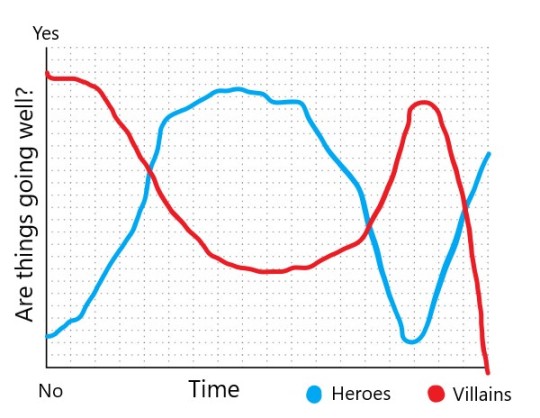
Whether things are going well for one side is inversely proportional to the other. During the Darkest Hour, when the hero is at their weakest, the villain is at their most dominant.
Wait… isn’t Silco the villain of Arcane? Not to be too blunt, but he’s having a shit time. Things are falling apart for him just as badly as for everyone else.
That's the trick. Caitlyn and Vi are suffering. Jinx is suffering. Silco is suffering. Jayce is suffering. Viktor is suffering. Zaun as a whole is suffering. There is only one party in the whole story that isn't suffering, that actually is benefitting from this horrid state of affairs...
EKKO AND HEIMERDINGER
Kidding. They're not really a part of this dance. A big part of Arcane's theming is that acting to help people without an agenda is simply more virtuous than fighting for any invariably-flawed nation that innately perpetuates the cycle of violence.
No, the side that is doing fine is the other that is conspicuously absent from my two prior lists. While the characters that make up its leadership are experiencing personal Darkest Hours, the organization itself is essentially on top of the world, having just scored a huge victory and getting set to bring the war to an end before it even begins. I mentioned how poor the situation for the Undercity looks, but not its counterpart.
Piltover.
Wasn't it so that Piltover started this whole mess? Didn't their oppression cause the revolt that orphaned Vi and Powder's parents? Isn't it their actions that drive Silco to ever greater extremes? Isn't it their normalized political backstabbing that causes Jayce to sacrifice his principles because that's the only way to get ahead? Isn't it their corrupt police force that lets Silco operate his drug empire with impunity?
Silco might look the part. He might be the most personally evil character, might be the one who causes the most misery for our main protagonists Vi and Powder.
But structurally, the shining city of Piltover, its political machine, and its Enforcers are the actual villains of Arcane.
#arcane#darkest hour#writing#silco#piltover#zaun#piltover and zaun#heroes and villains#good writing#just realized this#still noticing new things#even two full years later#i love this show#has someone said this before?#long post
219 notes
·
View notes
Text
Bi-Han is an honorable man
I can't believe that I'm making yet another post pointing out the obvious but every time I go into a Youtube comment section I'm starting to question whether me and the rest of the Mortal Kombat fandom have even played the same game.
1. He shows opponents mercy
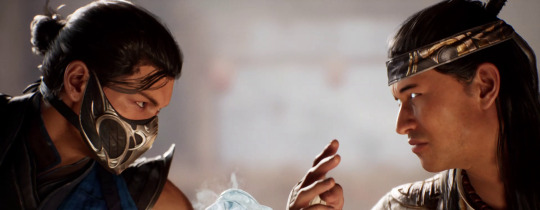
Sub-Zero: You want peace? Let us be.
Liu Kang: The Lin Kuei's sins aren't easily forgiven.
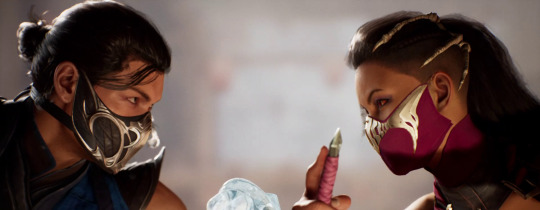
Sub-Zero: Surrender and Shao will show mercy.
Mileena: If you believe that, you're a fool.
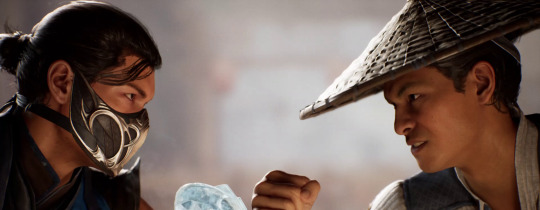
Sub-Zero: Walk away while you can.
Raiden: I'll never give up, never surrender.
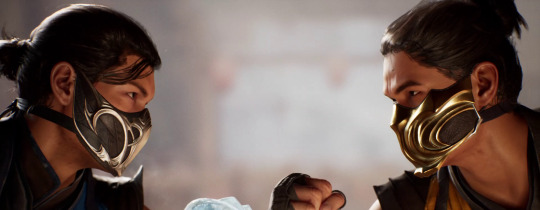
Sub-Zero: I won't hold back, Brother.
Scorpion: Do your worst.
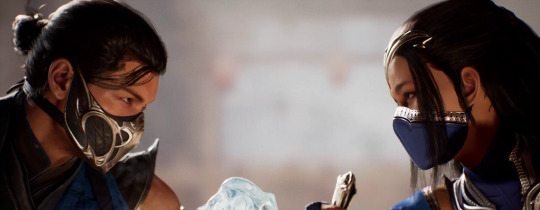
Sub-Zero: We have no cause for dispute.
Kitana: You aided Shao's attempt to steal the throne!
These dialogues honestly speak for themselves already, they don't even need explaining. Compare that to actual villains like General Shao who sends Reiko after Bi-Han to kill him simply because he "doesn't like loose ends" even after Bi-Han saved him or Shang Tsung who killed Reptile's family out of nothing but sheer cruelty.
The fact that Bi-Han is willing to let people walk away from a fight, that he gives them a chance to walk away alive, speaks volumes about his personality. He warns his opponents in his intros and even during his end of round taunts ("Flee now and live."), he tries to solve things peacefully and without violence if possible. He's not bloodthirsty, malicious or eager to kill anyone, but will do so if given no other choice.
Despite Bi-Han's flaws, a man willing to show an opponent mercy is an honorable man. SPOILERS AHEAD: May I again remind you that Kuai Liang is not willing to show a defeated and dying Bi-Han mercy when he gets turned into Noob against his will? Not only that, but Kuai Liang wouldn't have hesitated to kill Frost who is probably around Hanzo's age at his own wedding if Harumi hadn't stepped in to save her. Harumi had to beg Kuai Liang to show someone mercy, while Bi-Han grants it without a second thought. Like it or not, at least in that one aspect, Bi-Han is the better man.
I don't know why some people think of him as this aggressive guy going around trying to pick fights with everyone when all he wants is to be left alone? It's wild to me how people think he's the problem here.
2. He respects/admires their fighting skills
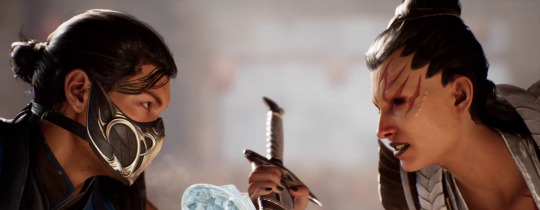
Sub-Zero: You will surely test my might.
Ashrah: I will overwhelm it, Sub-Zero.
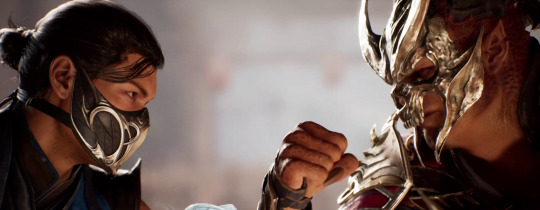
Sub-Zero: This fight I will long remember.
General Shao: Who says you will survive it?
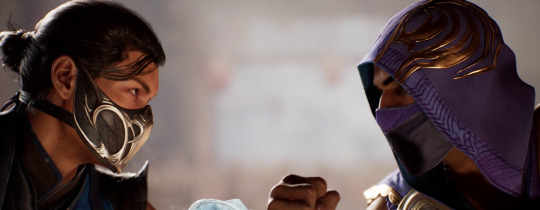
Sub-Zero: I'm pleased to fight Outworld's foremost mage.
Rain: Will it also please you to lose?
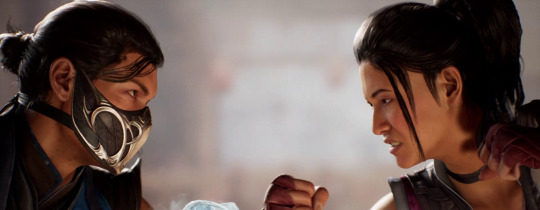
Sub-Zero: I hear your skills are formidable.
Li Mei: As are those of all who have been Umgadi.
Can we also talk about how respectful Bi-Han is towards his opponents? He compliments them on their skills as opposed to Kuai Liang who even talks down to his own allies. Yes, Bi-Han is arrogant, but he can still acknowledge other people's strengths and respect them, even if they are his foes.
3. He admits when he's wrong

Sub-Zero: I was wrong to trust you.
General Shao: Yes, Earthrealmer. You were.

Sub-Zero: I wasn't aware of Shang Tsung's experiments.
Liu Kang: Had you known, would your choice have been different?

Sub-Zero: Your mother's death is regrettable.
Kitana: I consider you complicit, Bi-Han.
You can say what you want about him, but he certainly takes responsibility for his actions and even shows regret over some of them. Bi-Han might not be the most compassionate character, but he does express some sympathy towards others. Compare that to Kuai Liang who tells Havik it's his own fault that his face was burned off as if he had nothing to do with it. Yes, Bi-Han doesn't show much sympathy towards Baraka for his condition, but neither does Kuai Liang. Why Kuai Liang is still considered the more honorable brother regardless of that and his very obvious ableism, is beyond me.
Bi-Han's good traits are all too often overlooked. I don't know if it's because people don't pay attention to intros, but it's so easy to see he's not a bad person deep down. It's just the media comprehension skills of most MK fans that are seriously lacking.
#bi han#bi-han#bi han sub zero#mk sub zero#mk bi han#kuai liang#mk scorpion#mk kitana#mk li mei#mk ashrah#mk liu kang#mortal kombat 1#mk1 2023
209 notes
·
View notes